“Education is the most powerful weapon which you can use to change the world.” – Nelson Mandela
In today’s digital era, this vision is being amplified through AI agents in education apps, transforming how students learn, teachers teach, and businesses grow.
From personalized tutoring to administrative automation, AI agents are not just tools; instead, they are redefining the future of EdTech.
But what is the Role of AI Agents in Education Apps?
AI Agents in education apps personalize learning, automate tasks, analyze performance, and create scalable, engaging, and cost-effective education experiences for teachers and students.
For entrepreneurs, investors, and EdTech innovators, understanding this role is crucial. Whether you’re building a new education app or integrating AI agents into an existing platform, it is one of the prime elements that you shouldn’t abandon.
Therefore, in this blog, we will walk you through the role, steps to integrate AI Agents, benefits, and much more.
Let’s get it started.
Key Takeaways
Role of AI agents in education apps: They act as virtual tutors, grading assistants, and content recommenders, personalizing learning while automating repetitive teaching and admin tasks.
Main benefit: AI agents increase student engagement, deliver instant feedback, and reduce teacher workload, driving scalable, cost-effective learning outcomes.
Business impact: Agentic AI supports multiple revenue streams including subscriptions, licensing, and AI tutoring, while improving retention, ARPU, and long-term EdTech competitiveness.
Technical focus: Success requires clean data pipelines, seamless LMS integration, and compliance with FERPA/GDPR for secure and scalable AI agent deployment.
Testing is critical: Performance, fairness, and security testing ensure AI agents in education apps remain accurate, accessible, and trusted at scale.
Future outlook: Expect hyper-personalization, AR/VR classrooms, predictive career guidance, and multilingual support to redefine agentic AI in higher education.
Why JPLoft: Partner with JPLoft, a trusted education app development company, to design, test, and scale AI agents with modular, compliance-ready solutions.
What are AI Agents in Education Apps?
AI Agents in Education Apps are sophisticated, autonomous programs that are meant to augment learning experiences by engaging with students, teachers, and administrators in real time.
While the current generation of chatbots responds, AI agents go further by analyzing information, learning from user requirements, and making decisions that tailor education. For instance, they can function as virtual tutors that provide individualized lessons, grading assistants that automate the evaluation of assessments.
Behind the scenes, such agents depend on technologies such as natural language processing (NLP), machine learning (ML), and large language models (LLMs) for contextual understanding and providing effective, customized outputs.
For businesspeople and investors, AI agents offer the possibility to build scalable, low-cost education apps that enhance performance, lower administrative load, and unlock new revenue opportunities.
As an investor or a businessman, it is quite efficient to learn about AI Agents, helpful to convert your educational app ideas into reality.
In short, AI Agents are the link between human learning requirements and smart automation in EdTech.
Benefits of AI Agents in Education Apps
Well, before you proceed with identifying the role of AI Agents in education apps, it's essential to consider the benefits first.
The benefits of educational apps have evolved significantly with the integration of AI agents, making it crucial to understand these advantages before exploring their specific roles.
You should integrate AI Agents to enhance the educational apps and provide the users with ultimate guidance.
Let’s consider the advantages for the students, teachers, and business owners in this section.
A] Advantages for Students
AI Agents in education apps do offer students personalized experiences through analyzing the overall student data for tailoring content and providing instant feedback.
Here are the advantages to consider.
-
Personalized Learning: AI agents adjust lessons to individual students' pace, strengths, and weaknesses, making learning more efficient.
-
24/7 Availability: Students have the ability to access immediate support at any time, whether for homework assistance, exam preparation, or concept clarification.
-
Interactive Engagement: Gamified quizzes, adaptive challenges, and conversational agents engage students in a fun and engaging way with learning.
-
Faster Feedback: Automated grading and real-time feedback enable students to immediately correct errors and improve performance.
-
Accessibility & Inclusivity: Voice, text, and multilingual support allow students of different abilities and regions to learn without barriers.
-
Skill & Career Guidance: AI agents can suggest learning paths, skills to focus on, and even career directions based on performance trends.
-
Stress Reduction: With round-the-clock help and personalized pacing, students feel less pressure compared to rigid classroom settings.
B] Advantages for Teachers
AI agents in education are not only beneficial for the students, it is important for the teachers. Therefore, the educational app design should be in such a way that it do helps the teachers with evaluating the students' performances and distributing grades.
Here is the list of advantages to consider.
-
Automated Grading & Tests: AI agents grade assignments, quizzes, and tests in a jiffy, lowering teachers' workload.
-
Personalized Student Insights: They give data-driven insights into student performance, enabling teachers to identify learning gaps and strengths.
-
24/7 Student Support: Agents take care of mundane queries so that teachers can engage in higher-order learning and mentorship.
-
Effective Lesson Planning: AI agents suggest resources, content types, and teaching methods suitable for various learning styles.
-
Classroom Management: Automates attendance, scheduling, and reminders, freeing teachers to teach more.
-
Increased Engagement: Gamified agents increase student engagement, enhancing lessons without additional teacher effort.
-
Reduced Stress: By removing repetitive administrative tasks, teachers are able to work on creativity, empathy, and impactful teaching.
C] Advantages for Business Owners
Integrating AI agents in education apps can be effective for businesses to personalize overall product recommendations, enhance customer engagement, and provide prompt responses. Hence, including the education app features that provide suitable benefits to the businesspeople is essential.
Here is the list of advantages for business owners to consider.
-
New Sources of Revenue: Monetize through subscriptions, paid AI tutoring, or the licensing of AI agent-driven solutions to institutions and schools.
-
High Retention Rates:: Gamification and personalized learning maintain students' focus, increasing daily active users (DAU) and long-term retention.
-
Scalability at Reduced Cost: AI agents serve thousands of users in parallel, minimizing the requirement for large support or teaching staff.
-
Competitive Differentiation: Intelligent agent apps differentiate themselves in the saturated EdTech space, appealing to more users and investors.
-
Data-Driven Insights: AI agents provide actionable insights into learning trends, enabling optimization of offerings and business outcomes.
-
Operational Efficiency: Bypassing admin workloads, student support, and content delivery lowers overheads and increases profitability.
-
Global Market Reach: Adaptable and multilingual AI agents expand app reach globally, unlocking new EdTech markets.
Well, learning about the advantages is not sufficient until you note the key roles of AI agents in the education apps.
Identifying the role of the AI agents is not only effective for the implementation of AI agents, but also effective to know how you can convert the AI agents' project ideas into reality. It will help you to evaluate the top roles to add functionalities in your education apps.
Now, let’s pursue the key role in the following section.
Key Role of AI Agents in Education Apps
The role of AI Agents in education apps is to help in driving personalization and help to opt for data-driven insights, offering personalized learning experiences, administrative automation, and much more.
If you are the one who wants to build an AI Agent, then identifying its role in the education market is the prime step to undertake.
Let’s learn about the diversified role of AI Agents in education apps, below.
1. Personalized Learning Tutors
A prime role of AI Agents in education apps is to redefine student learning by designing self-adjusting routes. Rather than standard, one-size-fits-all instruction, they tailor lessons, tests, and learning speed based on individual students' performance.
By monitoring improvement in real time, these agents suggest additional practice for weaker subjects and advanced work for high achievers. This provides extremely personalized, effective, and interactive learning.
2. Virtual Teaching Assistants
An AI Agent in education is a 24/7 teaching aide, which can respond to student questions, walk them through exercises, and even provide multilingual assistance.
That means students can receive immediate assistance without having to wait for the next class. Educators, on the other hand, save precious time by offloading mundane or low-complexity tasks, freeing them to be more imaginative and people-focused in their work.
3. Automated Grading & Assessments
Another important role of AI agents in education apps is to streamline tedious grading work by assessing quizzes, coding assignments, essays, and even descriptive responses accurately. A leading AI app development company knows how to integrate this feature for the overall enhancement of your platform.
In addition to grading, they provide feedback reports, identifying particular errors and recommending corrective measures. This minimizes human prejudice, accelerates evaluation cycles, and allows students to receive quicker feedback, resulting in improved learning outcomes and more productive classrooms.
4. Student Engagement & Gamification
Educational apps' agentic AI introduces gamification into learning through interactive challenges, leaderboards, and adaptive difficulty levels with gamification. These agents encourage learners through badges, reward progress, and provide feedback on real-time performance.
Such elements promote the process of converting passive learning into active engagement with learning, making the students engaged, curious, and regular in their studies.
5. Smart Content Recommendation
AI Agents in educational apps leverage data-driven personalization to suggest the most appropriate videos, eBooks, tutorials, or case studies. They learn from a student's behavior and offer just-in-time material that is based on the needs of the learner.
This way, students do not spend time on unrelated material but rather engage with content that enhances their knowledge base and aids exam preparation. Connecting with the leading AI agent development company can help guide you with the education apps.
6. Administrative Automation
Administration is another role of AI Agents in education platforms, which helps to automate the back-office aspect of schooling through the management of attendance records, exam timetables, and classroom alerts.
They also aid institutions with resource planning and scheduling optimization. This automation lightens the administrative load on teachers and staff, which enables them to focus more time on student participation and curriculum development.
7. Language & Accessibility Support
Agentic AI in higher education becomes more inclusive in its offering by providing multilingual translation, speech-to-text, and text-to-speech functionalities. The best language learning apps do implement AI agents to enhance their performance.
Students with disabilities are supported through screen readers, voice assistants, and AI-powered accessibility features. This means learners of varying geographies and capabilities have uniform access to quality education via digital platforms.
8. Career & Skill Guidance
AI Agents in educational apps function as career advisors by reviewing student performance, interests, and job market trends. You can start an online education business, including AI agents, and provide the students with career guidance.
They recommend courses, certifications, or career paths specific to individual talents. For instance, a student who is good at math and coding may be encouraged to pursue data science or AI-related fields, bridging scholastic learning with employability.
9. Predictive Analytics for Learning
An AI Agent in e-learning apps uses predictive analytics to predict student performance and identify likely underperformers or dropouts.
Through analysis of attendance, grades, and participation, it alerts when intervention is required. Teachers and institutions can then act promptly to assist failing students, thereby increasing overall success rates and reducing dropouts.
10. Virtual Class Moderation
Educational apps with agentic AI can manage live discussions, collaborative projects, and online forums, making interaction seamless.
They flag off-topic content, prompt quiet students to participate, and sustain the discussion on track. This makes it an organized, equitable, and secure digital learning space for large online courses in higher education institutions.
11. Real-Time Feedback & Support
AI Agents in Education give immediate feedback when students try out practice questions, coding drills, or simulations. Rather than waiting for teacher feedback, students comprehend errors instantly and can modify their strategy.
The real-time correct feedback loop increases confidence, facilitates ongoing practice, and speeds up mastery of sophisticated ideas. Here, all you need is to select the best AI agent framework, effective for enduring long-term success.
12. Fraud & Cheating Prevention
An AI Agent in education is essential during online tests. Through the integration of AI-based proctoring software, facial recognition, and behavioral analysis, the agents identify suspicious behavior, i.e., multiple individuals taking the test or odd screen switching.
The agents facilitate the integrity of tests, providing equitable results and institutions' credibility in offering online education.
13. Optimization of Resources for Institutions
Educational institutions use agentic AI to manage higher education better. Agentic AI optimizes faculty allocation, classrooms, and computerized resources in the institution.
For instance, AI agents forecast class sizes, recommend best schedules, and stabilize teachers' workloads. This leads to better resource allocation, cost reduction, and efficient institutional management.
14. Emotional Intelligence & Wellbeing Monitoring
One of the prime roles of AI Agents in edtech apps is to scan text, voice, and even facial expressions for signs of stress, frustration, or lack of engagement in students.
Upon identifying patterns of low morale, they suggest stress-relief materials, wellness exercises, or alert teachers for intervention. This provides a human-like emotional intelligence layer to online learning.
15. Future-Ready Immersive Learning
AI Agents in education are setting the stage for immersive classrooms powered by AR/VR. They are able to take students through virtual science labs, interactive history walking tours, or realistic simulations of the real world.
Through the integration of agentic AI and immersive technology, higher education institutions can provide experiential, hands-on learning experiences that transcend textbooks and lectures
When it comes to integrating AI in education apps, you should explore the initiatives and steps useful for this procedure.
How to Integrate AI Agents in Education Apps?
Yes, you can integrate AI Agents in education apps by following specific strategies and key steps.
You can build an education app, and it is effective in
Let’s learn about the steps to integrate AI agents in e-learning apps, below.
Step 1: Define the Purpose & Use Case
The initial step is to define clearly what function your AI Agent in education apps will perform. Will it be a virtual tutor, grading tool, or student engagement bot?
By targeting the use case, companies can concentrate on providing measurable results. A defined purpose avoids feature creep and ensures that students, teachers, or administrators experience tangible value from day one.
Step 2: Choose the Appropriate AI Model
Various applications need different AI models. For conversational tutoring, LLMs such as GPT-4 can be used, whereas machine learning algorithms are responsible for predictive analytics and performance monitoring.
Agentic AI in higher learning may also employ computer vision for exam monitoring or AR/VR implementation for interactive learning. Choosing the appropriate model helps achieve efficiency and scalability in the long term.
Step 3: Create a Data Pipeline
AI Agents in Education live on high-quality, accurate data. Building a real-time data pipeline enables the AI to process student performance, monitor behavior, and create insights.
Here, you need to define the complete education app business models before creating a data pipeline.
APIs can tap into school databases, learning management systems, and third-party knowledge bases. Without structured and clean data, the most brilliant AI model will not be able to give meaningful output.
Step 4: Develop a Seamless User Interface
The student and teacher should be able to communicate with the AI agent with ease. An intuitive interface may be a chat window, a voice-based tutor, or even an interactive panel.
The primary thing is to make it user-friendly so the user thinks they are talking to an intelligent digital aide instead of fiddling around in a complicated system. This makes it super easy for education apps to be adopted.
Step 5: Integrate Core Agentic Functions
At this point, incorporate the intelligence features that make the AI Agent in education smart. These include personalization engines for adaptive learning, automation workflows for grading or attendance, and decision-making systems for study path recommendations.
The goal is to integrate agentic behavior– i.e., the AI can act on its own, not merely respond to commands.
Step 6: Ensure Compliance & Privacy
Education is sensitive data about students, and therefore, compliance with COPPA, FERPA, and GDPR is mandatory. In education apps, AI Agents have to employ data encryption, consent processes, and audit trails to safeguard privacy.
In addition, institutions seek open policies describing how data are utilized to build the confidence of parents, teachers, and regulatory bodies.
Step 7: Integrate with Existing Systems
For school and university businesses, compatibility is the only way to go. The AI agent must be compatible with existing Learning Management Systems (LMS), CRMs, and cloud services. This minimizes the resistance to adoption and also makes it simpler to scale.
A plug-and-play model permits institutions to begin making use of the AI agent without needing costly infrastructure revamps.
Step 8: Incorporate Multilingual & Accessibility Features
For success in international markets, Agentic AI within education applications should be able to handle multiple languages, local accents, and varying accessibility needs.
Integrating speech-to-text, text-to-speech, and screen reader support makes the app more inclusive for differently-abled users.
Multilingual support also makes your application desirable in places such as Asia, Africa, and Latin America, where English is not the predominant language.
Step 9: Test Across Scenarios
Testing is crucial to maintain reliability. Perform functional testing to verify if the AI reacts properly, load testing to manage peak examination traffic, and security testing to avoid compromises. Thus, it's important to conduct mobile app testing for a long-term perspective.
An AI Agent within education must also be subjected to user experience testing, confirming that students find it easy and enjoyable to use. Ongoing testing ensures unproblematic functionality when deployed at scale.
Step 10: Deploy & Continuously Monitor
After being deployed, track KPI such as student interaction rates, session duration, and dropout prevention. Companies will also need to monitor feedback loops in order to hone the AI agent.
Ongoing monitoring enables frequent updates, patches, and new functionality so the app remains aligned with technology advancements and user requirements. With this, long-term adoption and investor trust are developed.
Here, connecting with the best mobile app development company to integrate AI and make your app successful in the growing industry.
Well, if you still wonder about implementing AI Agents in education apps, then learning about the top used cases can be helpful.
Hence, let’s proceed with the use cases of adopting AI agents in the following section.
Use Cases of AI Agents in Education Apps
Examples are the best teachers and can help you to distinguish your app from the competitors.
Here is the list of the top educational apps that have adopted AI agents and are learning in this industry.
Let’s proceed further.
1. Duolingo
Duolingo uses AI agents in education apps to provide adaptive learning experiences. Its AI-driven placement test adapts to each learner's level, while Duolingo Max employs GPT-driven conversational agents for role-play practice and immediate feedback.
These agents are virtual tutors, facilitating adaptive lessons and real-time speaking practice, which increases engagement and retention, making it essential to know how to create an app like Duolingo.
2. Babbel
Babbel uses agentic AI in education apps to improve language training through speech recognition and conversational feedback agents.
These AI agents review pronunciation, grammar, and fluency in real time, providing students with corrective tips like a personal coach.
By mimicking real-life conversations, Babbel helps learners build confidence while minimizing reliance on live tutors, making the cost to develop an app like Babbel a key consideration for EdTech entrepreneurs.
3. Kahoot!
Kahoot! uses AI agents in education through its AI Question Generator, which automatically generates quizzes, flashcards, and games from teacher notes or uploaded documents. This minimizes prep time for teachers and maximizes interactivity for students.
The AI agents here are content creation assistants, empowering teachers and learners to gamify education at scale, making them strong Kahoot alternatives.
4. Quizlet
Quizlet uses AI Agents in education apps through its "Q-Chat" feature, driven by GPT, as an interactive learning buddy.
Students can ask questions, test themselves, and receive instant feedback from the AI agent. This role-play type learning simulates one-on-one tutoring, making study sessions more dynamic and personalized.
5. Coursera
Coursera employs Agentic AI in higher education to tailor learning paths for students. Its AI agents suggest courses, provide automated feedback on assignments, and offer predictive insights into student progress.
For teachers, these agents are workflow automatons, automating grading, student support, and content delivery at scale.
6. Socratic by Google
Socratic uses AI Agents in Education to assist students in solving homework problems. Its AI agents can scan a problem through a camera, comprehend the context through NLP, and offer step-by-step explanations.
Unlike static solutions, the AI agent explains the rationale, facilitating deeper learning instead of rote memorization.
These were some of the use cases of integrating AI Agents. Well, partnering with the leading company can help you implement effective practices related to AI for enhancing your app’s presence and sustainability in the market. Hiring these experts will further help you in accommodating the AI Agents and their implementation in your app.
Future of AI Agents in Education
Adopting the recent education app trends can help you sustain in the diversified market in the long run.
Hence, here is all about the future of AI agents in education apps that you should consider.
► Hyper-Personalized Learning Paths
AI Agents in Education will create customized learning maps according to each learner's abilities, speed, and objectives.
They will dynamically adapt lessons, quizzes, and challenges using real-time analytics. By having adaptive difficulty levels, learners will stay engaged but not frustrated.
Over the long term, this individualization could be more effective than current classrooms in retention and understanding.
► Immersive & Interactive Classrooms
Higher education agentic AI will converge with AR/VR, offering virtual labs, history walkthroughs, and real-world simulations.
AI agents will serve as virtual moderators in the classroom, guaranteeing attention during immersive experiences.
Students will have hands-on, real-world training in medicine, engineering, or science without material limitations. This will democratize access to costly resources (e.g., virtual labs in place of expensive physical arrangements).
► Intelligent Career & Skill Pathways
AI Agents in education will function as career guides, superimposing academic progress with job market trends.
They will suggest certifications, internships, or skill modules compatible with emerging sectors.
Predictive insights will enable students to select career paths early, avoiding mismatches between education and jobs. For institutions, this makes them stand out as future-ready learning centers.
► Data-Driven Decision Making for Institutions
AI Agents in education applications will offer predictive analytics for resource planning, enrollment, and retention plans.
Administrators will use AI-powered dashboards to track performance, optimize teaching personnel, and course plan. Fraud detection agents will prevent cheating or online resource abuse.
In the long term, institutions can reduce costs while increasing quality and confidence in digital learning.
► Emotional Intelligence & Mental Wellbeing
Future AI agents will have sentiment analysis, stress detection, disengagement, or burnout among students.
They will proactively suggest wellness exercises, breaks, or counseling sessions.
Teachers will receive notifications of at-risk students, allowing timely interventions. This human-like EQ layer will balance academics and emotional care, building healthier digital classrooms.
► Global Accessibility & Inclusion
Educational apps' agentic AI will overcome language barriers through multilingual translation and localized learning materials.
Differently-abled students will gain from voice-based and accessibility-first functionality.
Low-cost AI agents will deliver high-quality education to underserved areas. This promotes equal learning opportunities across the globe, closing gaps in access.
Hence, proceeding with AI Agents in education apps can help you to sustain the competition and improve overall performance.
Partner With JPLoft and Integrate AI Agents in an Education App
Building an AI-powered education platform requires not just innovative ideas but also a reliable Education App Development Company to execute them seamlessly.
That’s where JPLoft stands out. With expertise in AI integration, JPLoft helps you design and deploy intelligent agents that act as virtual tutors, content creators, and administrative assistants.
Whether it’s adaptive learning paths, real-time assessments, or multilingual support, JPLoft ensures your app delivers personalized and engaging experiences to students and teachers alike.
As a partner, JPLoft provides end-to-end solutions, right from planning the AI agent’s role, choosing the right tech stack, to ensuring compliance and scalability.
Their modular approach makes it easy to expand features as your user base grows. If you’re looking to future-proof your platform and create meaningful impact in the EdTech industry, partnering with JPLoft is the smartest step toward integrating AI agents in education apps.
Conclusion
AI agents in education apps are no longer just futuristic concepts; they are practical tools transforming how students learn, teachers teach, and institutions operate.
From acting as virtual tutors to automating grading, enabling predictive analytics, and driving global accessibility, their roles are reshaping EdTech.
Case studies from Duolingo, Babbel, Kahoot!, Quizlet, and Coursera highlight their proven success in boosting engagement and outcomes. Looking ahead, hyper-personalized learning, immersive classrooms, and career-driven pathways will define the future.
For entrepreneurs and investors, now is the time to integrate AI agents strategically and build scalable, competitive, and future-ready education platforms.
FAQs
Autonomous programs that analyze context, learn, and act, beyond scripted replies, personalizing tutoring, grading, and support in real time
The key role of AI agents in education apps act as personalized learning assistants. They adapt lessons based on a student’s progress, provide instant feedback, and answer questions in real-time. These agents can also automate administrative tasks like grading, scheduling, and content recommendations, making education apps more interactive, efficient, and student-focused.
Unlock subscriptions and licensing, increase retention, reduce support costs, and deliver analytics for data-driven product and revenue decisions.
Define use cases, choose models, build data pipelines, design intuitive UX, ensure compliance, integrate with LMS, test, monitor, iterate.
Hyper-personalized learning, AR/VR classrooms, career agents, institutional analytics, wellbeing monitoring, and inclusive multilingual access at global scale.





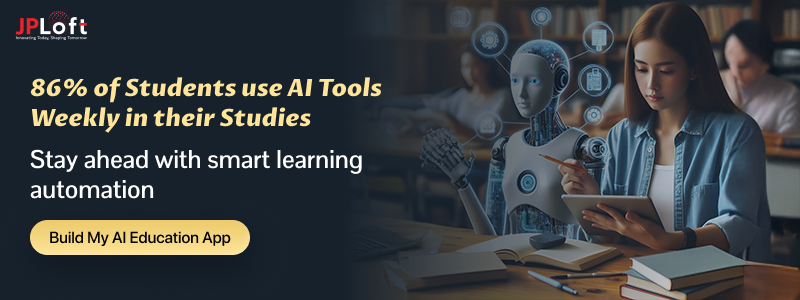
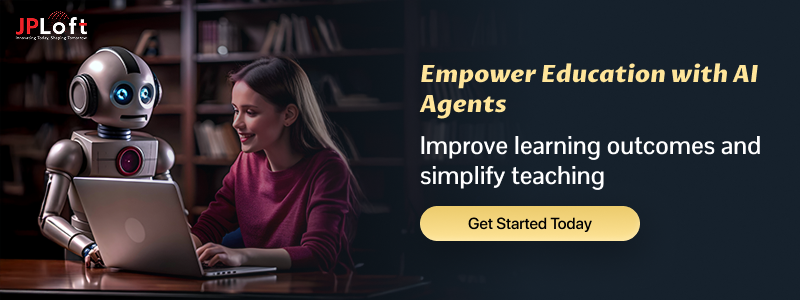

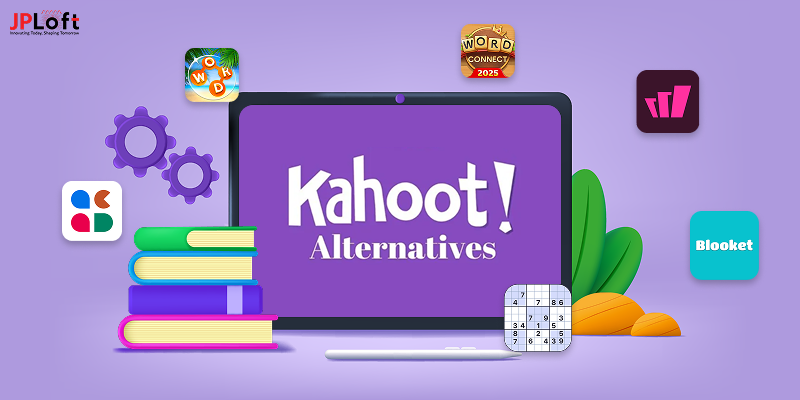
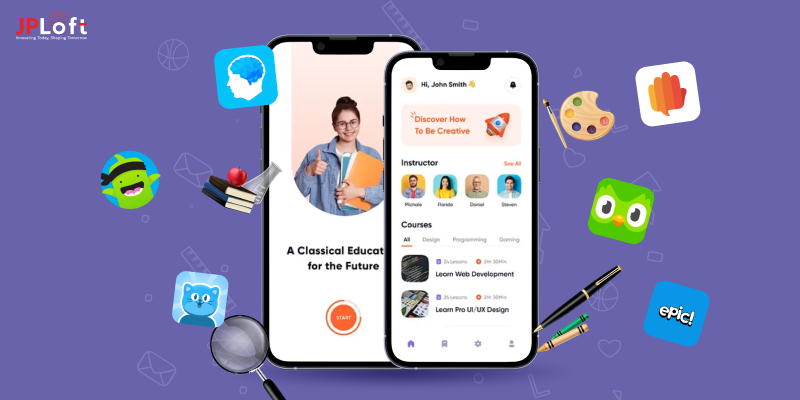
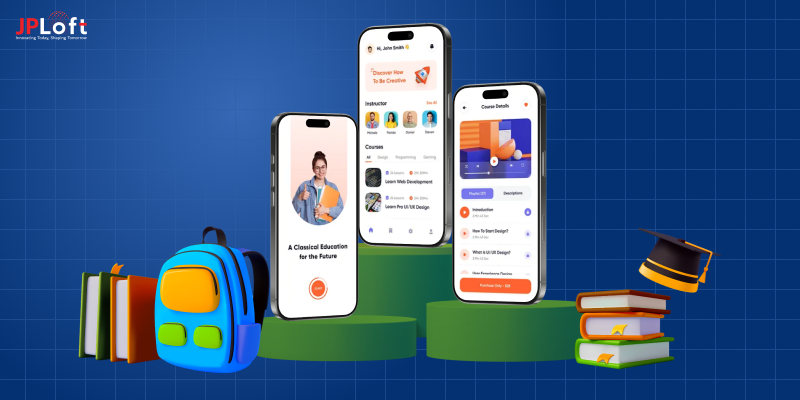


Share this blog